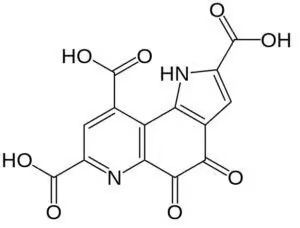Table of Contents
PQQ (pyrroloquinoline quinone or methoxatin) is a very potent antioxidant and plays a significant role in cognition and memory.
PQQ is the first nutrient discovered that promotes the growth of new mitochondria (mitochondriogenesis) in your cells. Brain cells have a higher concentration of these little cellular power plants than most other cells in your body.[i]
You can have anywhere from two to several thousand mitochondria in each brain cell. They even have their own DNA. When you increase the number of mitochondria, you have more cellular energy to power through your day.
PQQ was only discovered recently. But it’s been around for a very long time. So don’t roll your eyes when some New Ager claims that we’re made of stardust. PQQ was discovered aboard NASA’s spaceship “STARDUST” in interstellar dust particles.[ii]
PQQ plays a role in neurogenesis by helping to form the growth of new neurons through the stimulation of nerve growth factor (NGF).
PQQ protects against oxidative damage by shielding against cellular death and damage to DNA. It reduces inflammation in your brain. And it shields your brain from glutamate-induced toxicity preventing apoptosis (cell death).
PQQ is able to save and revive brain cells damaged from beta amyloid proteins associated with Alzheimer’s Disease. And prevents the formation of alpha-synuclein proteins that cause Parkinson’s Disease.
So give yourself an unfair advantage and add PQQ to your nootropic stack. Boost your brain power. And improve your energy, cognition, memory, and recall.
PQQ helps:
- Mitochondria. PQQ can increase the number of mitochondria in your brain cells. Mitochondria have their own DNA, and if you supply this super-nutrient, they start multiplying in each of your brain cells. It helps stop and reverse cell death. And increases cognitive function and efficiency.
- Neuroprotectant. PQQ helps clean up free radicals and oxidative stress damage in brain tissue. You proactively prevent mitochondria death and keep brain cells healthy.
- Nerve Growth Factor. PQQ stimulates production of nerve growth factor (NGF) which helps the growth of new neurons. And the branching of neurons. Improving memory and repairing damage caused by strokes.
Overview
PQQ (pyrroloquinoline quinone) was first recognized as an enzyme cofactor in bacteria by Norwegian biochemist Jens Hauge in 1964.[iii] It wasn’t until 2003 that Japanese brain researcher Tadafumi Kato found that PQQ also occurs in rodents and other mammals, including humans.

As an enzyme cofactor, PQQ is critical to the life of your brain cells. And some would say it’s even critical to life itself. “Cofactors” are molecules that act as a helper for enzymes that need assistance to work properly.
Recent studies verify the unique ability of PQQ to stimulate the creation of new mitochondria.[iv] And to improve the function of your existing mitochondria. But why would you want to hack your mitochondria?
It is an understatement to overstate the dramatic impact this has not only in your brain. But in your entire body. Mitochondria’s role is to convert the food we eat into energy that powers cells to perform at peak function.
This process of mitochondriogenesis stops and reverses brain cell death, and brain degeneration. PQQ is the only nutrient that can do this. And more energy in your brain cells means quicker thinking, better memory, amped-up alertness, less mental fatigue and more.
PQQ stimulates the growth of new neurons through the promotion of nerve growth factor (NGF) in brain cells. Resulting in improved memory, cognition and learning.[v]
PQQ is also a potent antioxidant mopping up free radicals that would otherwise damage brain cells.
PQQ is used in every cell in your body. And is particularly useful in brain cells. It’s about as close you can get to a vitamin without ‘officially’ being declared a vitamin.
You get PQQ from some of the food you eat including beans, celery, cocoa, fermented foods (i.e. tempeh, natto), kiwi, papaya, parsley, potatoes, spinach and wine. Babies get it from breast milk.
How does PQQ work in the brain?
PQQ boosts brain health in several ways. But two in particular stand out.
- PQQ promotes the growth of new mitochondria. This is the only known nutrient that can perform this function.
Mitochondria are the source of life and death for neurons. They generate your neuron’s energy and control its death. But mitochondria tend to develop defects as we age.
As these defects accumulate, mitochondria start to malfunction. This results in a reduction in cellular energy production. And cells die.
The result of this dysfunction can be brain fog, cognition problems, poor memory and recall. And ultimately neurodegenerative diseases like Alzheimer’s, Parkinson’s, Huntington’s, stroke and others.
Studies show that PQQ protects against this cellular damage by repairing and helping to create new mitochondria. Studies with mice and rats, and eliminating PQQ from their diet have shown reduced mitochondria.
To demonstrate how this process works, scientists added PQQ to mouse cells in the lab. And they showed that PQQ activated the cAMP response element-binding protein (CREB), and peroxisome proliferator-activated receptor-gamma coactivator-1alpha (PGC-1alpha). This pathway is known to regulate mitochondrial biogenesis.[vi]
- PQQ helps grow new neurons. This unique nutrient promotes the production of nerve growth factor (NGF). Assisting in brain cell repair, maintenance, and regeneration. Including many of the cells that are crucial for cognition, memory and learning.
NGF is especially important for maintaining neuroplasticity. This process is how brain cells form connections to communicate with each other. And is how we learn new stuff and then record it to memory.
By stimulating the production of NGF, PQQ has been found to protect memory and cognition in both animals and humans.
In one study, scientists demonstrated PQQ’s ability to promote the healing of injured nerves. The team used 90 healthy White Wistar rats, and divided them into 3 groups. The rats had injured (purposely) sciatic nerves. And were treated with Vitamin E, PQQ or combination of both.
The scientists found that 12 weeks after surgery and the introduction of PQQ to the wound, the nerves grew back! They concluded that the combination of Vitamin E with PQQ promoted nerve regeneration.[vii]
Another way that PQQ influences new neuron development is by protecting neuron stem and progenitor cells from glutamate toxicity (oxidative damage). This allows neurons to survive and potentially form new brain cells.[viii]
How things go bad
As we get older, the chemistry in our brain cells and energy metabolism changes.
↓ Neurons degenerate
↓ Recall, reaction time, memory, and mood diminish
↓ Neurotransmitter levels decline
All of these age-related changes are contributing factors to the neurodegenerative diseases of aging, including Alzheimer’s and dementia.
But even if things haven’t degenerated to such a debilitating level, PQQ can help.
PQQ benefits
Research from hundreds of studies have shown that PQQ will:
- Boost energy levels and stamina
- Reduce fatigue
- Improve sleep
- Reduce the possibility of age-related diseases
- Improve cognition, memory, learning and recall
- Repair damage caused by strokes
- Protects against Alzheimer’s and Parkinson’s
- Lowers LDL (bad) cholesterol[ix]
PQQ is an extremely powerful antioxidant. For example, PQQ is able to carry out 20,000 catalytic conversions, compared only 4 for Vitamin C.[x]
The studies in Parkinson’s Disease prevention and PQQ are particularly interesting. And applicable to neurohackers of any age.
We are exposed to pesticides in most of the fruit and vegetables we pick up at the supermarket. And who knows what kind of brain damage we subject ourselves to every day just from the food we eat.
In the lab, animals (rats and mice) have a pesticide injected directly into their brain to induce Parkinson’s-like symptoms. In one study, PQQ not only showed a protective effect against pesticide caused brain damage. It actually preserved brain mitochondria near control levels. [xi]
The message here is buy organic food, or supplement with PQQ. And you may be able to avoid getting Parkinson’s Disease later in life.
How does PQQ feel?
Mitochondria biogenesis means that your body is creating new mitochondria. PQQ increases the number of mitochondria in your brain cells. And throughout your body where energy demands are high.
Increasing your body’s mitochondria is one of the anti-aging ‘holy grails’. Boosting these tiny cellular energy power plants can prevent further damage. It can add overall energy to daily life. And maybe even slow down the aging process.
Neurohackers report dramatic improvements in mental and physical energy when adding PQQ to their nootropic stack. And I recommend adding CoQ10 for the synergistic effect.
PQQ has a cumulative effect and benefits should continue to improve over continued usage. For some the effects are immediate. For others it could take 2 or 3 months of dosing PQQ every day or every 2nd day.
PQQ is particularly effective if you’ve suffered mitochondrial damage from using statins.
Memory improves and you’ll be able to think things through more easily. Alertness gets a boost. And better vision and less eyestrain if you’re working on a computer, or staring at a screen all day.
Blood pressure readings could normalize. And you’ll feel refreshed and well-rested when waking up.
If you are dealing with Fibromyalgia you may get some benefit from PQQ with alleviating your chronic pain.
PQQ Clinical Research
PQQ Improves Mood
This study in Japan investigates the effectiveness of supplemental PQQ on stress, fatigue, quality of life and sleep. 17 adult male and female subjects took 20 mg of PQQ daily for 8 weeks.
Changes in stress, fatigue, quality of life measures and sleep were evaluated. The study showed that vigor, fatigue, tension-anxiety, depression, anger-hostility and confusion improved following administration of PQQ.
Measures for quality of life, appetite, sleep, obsession and pain also improved significantly. The volunteers also showed significant improvement in sleepiness at awakening, sleep onset and maintenance, and sleep duration.
The researchers concluded that supplementing with PQQ improved sleep quality and duration, mood improved due to less fatigue, and appetite, pain and obsession all showed improvement. And that PQQ is a “useful dietary supplement”.[xii]
PQQ Improves Cognition
PQQ is effective on its own in improving brain function. But when it is combined with CoQ10 the results are even more astounding. This synergy was first observed in animal studies. And was further demonstrated in a double-blind, placebo-controlled trial in Japan.
71 middle-aged and elderly volunteers age 40 – 70 were supplemented with 20 mg per day of PQQ. The result was an improvement on tests of higher cognitive function compared to placebo.
Then the research team gave the volunteers 20 mg of PQQ along with 300 mg of CoQ10. And the results in improved cognitive function were even more dramatic. PQQ and CoQ10 are both involved in mitochondrial function. So these results did not come as a big surprise.[xiii]
PQQ Boosts Memory
Many older adults experience problems with memory and other cognitive functions. And these issues seem to be happening to younger and younger people. As neurohackers, we always ask the question, “Are these declines inevitable?” And to that we say a profound, “No”!
In this Japanese double-blind, placebo-controlled trial 65 adults aged 50 – 70 years with forgetfulness were recruited. The volunteers were given 20 mg of PQQ and 100 mg of CoQ10 per day for 24 weeks.
The research team found that PQQ taken either alone, or in combination with CoQ10 has the potential to prevent, or even reverse, the decline in cognitive function caused by aging and oxidative stress.
The team concluded “PQQ was found to improve not only immediate memory, but also other higher brain functions such as spatial awareness. The effects of PQQ were enhanced when the substance was used with CoQ10.”[xiv]
PQQ Recommended Dosage
 You get PQQ from some of the food you eat including beans, celery, cocoa, fermented foods (i.e. tempeh, natto), kiwi, papaya, parsley, potatoes, spinach and wine. Babies get it from breast milk.
You get PQQ from some of the food you eat including beans, celery, cocoa, fermented foods (i.e. tempeh, natto), kiwi, papaya, parsley, potatoes, spinach and wine. Babies get it from breast milk.
Estimated daily intake of PQQ is 100 – 400 mcg. But it’s unlikely you’re getting enough PQQ from diet alone. And supplementation of this mitochondria generator could help.
Clinical studies with humans and animals tell us that 20 mg of PQQ daily is needed to experience cognitive benefit.
PQQ Side Effects
The primary “side effect” of using PQQ in your nootropic stack is – you’ll feel better. You should have more energy and thinking should be clearer and faster.
PQQ is non-toxic and supplementation is well-tolerated by most people.
Type of PQQ to buy
PQQ comes in tablet or capsule form 10 mg, 20 mg and 30 mg.
But you need to be aware of different forms of PQQ in the marketplace.
There is only 1 form available that is produced naturally. And that is BioPQQ® by Mitsubishi Gas Chemical Company of Japan. This company makes PQQ through bacterial fermentation. BioPQQ is licensed to several supplement makers.
You can get 10 mg BioPQQ® in the new Performance Lab® Energy formula that also contains Coenzyme Q10 100 mg (MicroActive® Q10), Acetyl-L-Carnitine (ALCAR) 750 mg, R-Lipoic Acid 150 mg (Bio-Enhanced® Na-RALA), and Piperine 2.5 mg (BioPerine®). A great way to boost your physical and mental energy without resorting to stimulants or caffeine.
Other forms of PQQ are produced through a chemical synthesis, involving the use of fairly toxic compounds, and have unresolved safety issues.
Nootropics Expert® Recommendation
PQQ 10 – 20 mg per day
 I recommend using PQQ as a nootropic supplement.
I recommend using PQQ as a nootropic supplement.
Your body does not make PQQ on its own. You can get some PQQ from the food you eat. But studies have shown we may not get an adequate supply of PQQ from food sources in our diet.
PQQ helps create mitochondria in your brain cells. When cellular energy gets a boost, you can experience better and faster thinking, learning is easier, recall is faster, and you’ll be more resistant to fatigue.
PQQ is especially helpful for those suffering from age-related cognitive decline. Studies show it helps stop or reverse brain degeneration with Alzheimer’s and Parkinson’s Disease. Especially in the early stages of the disease.
I suggest starting with a dose of 10 – 20 mg daily. And PQQ is a great compliment to a stack including any nootropic. It works particularly well when combined with CoQ10.
My favorite nootropic stack for boosting physical and mental energy is the new Performance Lab® Energy formula that uses the patented, natural BioPQQ® combined with Acetyl-L-Carnitine, R-Lipoic Acid, and BioPerine .
You need to provide your brain cells with fresh mitochondria and supply neurons with the fuel it is demanding. Or neurons start to break down from the inside. Signs that your lacking adequate PQQ is brain fog, slow thinking, headaches and muscle aches.
Age-related cognitive disorders that include muscle control problems may want to up the dose to 30 mg per day. But for a limited time until PQQ blood levels are stabilized. Work with your doctor.










Join The Discussion - 99 comments
Jacki Alley
May 1, 2020
Do you know of any effects PQQ would have on a pituitary tumor called a prolactinoma causing elevated prolactin, amenorrhea. Normally, doctors treat with a dopamine agonist or surgery. The dopamine agonist gives me horrible headaches and dizziness.
David Tomen
May 4, 2020
Jacki, I did not come across anything regarding PQQ and its effects on pituitary tumors when researching this review. And a search today didn’t come up with anything either.
Donna
April 14, 2020
Hi David! Thank you for the informative article! A couple of questions for you: First, my dad has been diagnosed with Parkinsons…..he has had symptoms for several years. Is it too late for him to start taking PQQ or has the damage already been done where PQQ wouldn’t help? He does take prescription meds to increase dopamine levels so I know he would have to discuss with his doctor first. I wasn’t sure if it was even worth discussing with his doctor, or if it would help reverse some of his symptoms?
Secondly, I began taking 20mg PQQ yesterday and woke up with a headache this morning which has lasted all day. This is Doctor’s Best brand w/ Bio PQQ. Should I continue taking and see if the headaches go away eventually or is there a better brand? I think I started taking this last year and probably discontinued due to headaches.
Thank you for your help!
David Tomen
April 21, 2020
Donna, BioPQQ® is the best available form of natural PQQ which is made through a fermentation process to mimic how you’d get it from food. I’m not aware of any side effects caused by this form of PQQ.
The headaches may be caused by “Other Ingredients” which even some of the most respected manufacturers are guilty of using. But I think the Doctor’s Best version doesn’t contain any “other ingredients”. IT could be that supplemental PQQ is just the wrong supplement for you.
Kay
April 5, 2020
Will you please discuss PQQ in Cacao v cocoa?
Thank you!
David Tomen
April 23, 2020
Kay, cacao powder is one of the foods that contain more PQQ than others. But you’d need to eat several kilograms of cacao powder per day to get a daily dose of 10 mg of PQQ.
Nicole L.
March 11, 2020
Hi David,
Thank you for this great write up!
I was reading through the comments and the one regarding the “rewind” where the person got worse before better stood out to me. I tried 40mg of PQQ for the first time today. Within an hour I noticed I started getting stomach cramps with the awful diarrhea. That went on for at least half the day and then transitioned to whole body joint inflammation and aching. I have been researching all day trying to figure out why this happened. It makes absolute no sense to me. I changed nothing else today. I have Hashimoto’s, histamine intolerance, and possible MCAS or CIRS. Maybe within the theory of worse before better I need to lower the dosage to 20mg?
-Nicole-
David Tomen
March 12, 2020
Nicole, PQQ itself cannot cause that type of side effect. I think you either got a bad bottle of PQQ. Or your system took issue with one of the “other ingredients”. Check the back of he bottle for “other ingredients” and if it’s anything other than the capsule I suggest doing some research on each of those ingredients.
If you are going to continue with PQQ choose a different manufacturer. And find a supplement with as few “other ingredients” as possible. And one that uses BioPQQ which is a patented version.
This article should help when choosing your supplements: https://nootropicsexpert.com/7-tips-for-choosing-the-highest-quality-nootropic-supplements/
Nicole L
March 12, 2020
Appreciate the reply!
So I was wrong, it was 20 mg not 40.
But it’s from Seeking Health, which is pretty high quality brand. I will look into the fillers though.
-Nicole-
David Tomen
March 14, 2020
Nicole, looks up the Side Effects for Xylitol and particularly what Dr. Axe has to say near the bottom of his post on this additive. It could be that or you got a bad bottle.
L eNicol
March 14, 2020
I think it may have just been odd luck actually. I take another supplement from seeking health with the exact same fillers daily with no issue. I’ll have to give it another try in a few weeks. Thanks for the responses!
-Nicole-
Lois
May 26, 2020
I have been taking doctor’s best biopqq and have also been experiencing stomach pain and headaches which have only gotten worse the longer I’ve taken it. Ingredients listed are
PQQ (Pyrroloquinoline Quinone) (as PQQ disodium salt) 20 mg, Cellulose, modified cellulose (vegetarian capsule). I have searched all over the web for side effects from pqq with little results. I have however seen some people listing these side effects in pqq supplement reviews and even check pain. Although this might be good for some people, as with any supplement, it’s not always best for all. These side effects may be rare but based on these reports, I believe this information should be updated and listed as a possible side effect in some people.
David Tomen
May 26, 2020
Lois, thanks for your report. I’ve since done another search for “side effects” for PQQ and came up with nothing.
The thing is that in my 13 years of experience with researching and using all kinds of nootropic supplements, and getting feedback from neurohackers around the world, there is one sure thing. And that is no single supplement will work for everybody. Some may even cause negative effects not listed in known side effects.
But I’m sure you can appreciate it would be impossible to list every anecdotal report of negative responses for each supplement I’ve reviewed or will review in the future.
Geno
August 13, 2020
I started taking it today as well ( 20 mg) and have a crushing headache.
David Tomen
August 14, 2020
A headache is a very unusual side effect for PQQ Geno. Could be that this supplement is just not for you.
Rosa
February 18, 2020
Buenos dias Doctora, por favor necesito su opinion, verá aconsejé a mi madre tomar PQQ y Q10 pues siempre está muy cansada y es una gran fumadora por lo que pensé que era hora de tomar algún suplemento antioxidante. La dosis durante un mes ha sido 100mg ubiquinol y 10 mg PQQ (pilorroloquinolina) dos potentes antioxidantes.
Mi sorpresa ha sido cuando he leido un articulo en el que se dice un exceso de antioxidantes puede favorecer el cancer de pulmon. Mi madre es una gran fumadora por lo que inmediatamente la he llamado y le he dicho que deje de tomarlo, pero me he quedado con un miedo muy grande. Si pudiera darme su opinión al respecto se lo agradeceria de corazón. Gracias de antemano y enhorabuena por su canal y su sabiduría. Un saludo
David Tomen
February 19, 2020
Rosa, if you can translate your question in English I’ll be able to respond. I do not speak Spanish.
SunWisher
November 26, 2019
Heard this can heal up old dead nerves from bad heart attacks.
Have you read about that yet?
David Tomen
November 26, 2019
SunWisher, we focus on brain health around here. But we have hearts too! According to this clinical study: https://www.ncbi.nlm.nih.gov/pubmed/15770429 PQQ does indeed help support ‘bad hearts’.
Romuald
August 24, 2019
Hello David,
I was taking PQQ for 6 weeks, 20 mg per day with 200 mg of CoQ10 and I felt really great (more energy, much better mood and sleep etc.) but before I finished my first bottle I experienced a terrible prostatities (bacterial inflammation of prostate) and my doctor prescribed me antibiotics (Ciprofloxacin) for that. I stopped taking PQQ because I was afraid of possible side effects of these 2 medicines taken together. On one of the websites I read that PQQ boosts growth in bacterias. I had already prostatities 5 years ago and since then I know that it`s possible that I`ve been carrying bacterias in my prostate gland over the years as it`s very difficult for antibiotics to penetrate prostate gland deep enough to kill all bacterias and heal it completely. Do you think that I could have possibly boosted growth of bacterias in my prostate by taking PQQ and it caused return of my prostatities?
David Tomen
August 25, 2019
Romauld, PQQ boosts mitochondria and bacteria physically cannot contain mitochondria. This sounds more like a coincidence to me than a cause. I simply can’t imagine how PQQ boosts bacterial growth. It doesn’t seem possible.
You bigger problem is using antibiotics. I realize in your case it’s necessary. But I highly suggest replenishing your microbiome that have been killed off by the antibiotic. https://nootropicsexpert.com/psychobiotics-gut-brain-connection/
Romuald
August 25, 2019
Thank you very much David for your kind reply. I`ll follow your advice.
Best regards,
Romuald
Marco Bruciati
May 20, 2019
hello i am Marco from itali. i took antibiotics fluorochinolone, and after this was terrbile : no sleep, toxic farmacologi, tremors, small epatit, neuropati and inflamation of legs. mitocondria was die beacuse fluoro kill all mitocondria DNA , not only in bacteria but all . SO after PQQ after 3 days i was better. after 2 weeks now i feel very very better. still have problems to legs but in brain all is better. now i use pqq whit q10 and vitamine E and NAC . i think must use NAC toghether for have hight GLutatione.
i think for all person had took Fluorochinolone must take PQQ . must be protocol